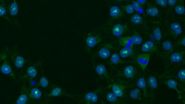(Press-News.org)
First study to show pattern of telomere changes at multiple time points as cancer develops
Telomeres can look 15 years older in people developing cancer
Pattern suggests when cancer hijacks the cell's aging process
CHICAGO -- A distinct pattern in the changing length of blood telomeres, the protective end caps on our DNA strands, can predict cancer many years before actual diagnosis, according to a new study from Northwestern Medicine in collaboration with Harvard University.
The pattern -- a rapid shortening followed by a stabilization three or four years before cancer is diagnosed -- could ultimately yield a new biomarker to predict cancer development with a blood test. This is the first reported trajectory of telomere changes over the years in people developing cancer.
Scientists have been trying to understand how blood cell telomeres, considered a marker of biological age, are affected in people who are developing cancer. But the results have been inconsistent: some studies find they are shorter, some longer and some show no correlation at all.
The paper was published April 30 in EBioMedicine, a new a new journal from Elsevier in collaboration with The Lancet and Cell Press.
The Northwestern and Harvard study shows why previous results were confusing.
In the new study, scientists took multiple measurements of telomeres over a 13-year period in 792 persons, 135 of whom were eventually diagnosed with different types of cancer, including prostate, skin, lung, leukemia and others.
Initially, scientists discovered telomeres aged much faster (indicated by a more rapid loss of length) in individuals who were developing but not yet diagnosed with cancer. Telomeres in persons developing cancer looked as much as 15 years chronologically older than those of people who were not developing the disease.
But then scientists found the accelerated aging process stopped three to four years before the cancer diagnosis.
"Understanding this pattern of telomere growth may mean it can be a predictive biomarker for cancer," said Dr. Lifang Hou, the lead study author and a professor of preventive medicine at Northwestern University Feinberg School of Medicine. "Because we saw a strong relationship in the pattern across a wide variety of cancers, with the right testing these procedures could be used to eventually diagnose a wide variety of cancers."
The Northwestern and Harvard study is believed to be the first to look at telomere length at more than one time point before diagnosis. That's significant because cancer treatment can shorten telomeres. Post treatment, it's uncertain whether their length has been affected by the cancer or the treatment.
"This likely explains why the previous studies have been so inconsistent," Hou said. "We saw the inflection point at which rapid telomere shortening stabilizes. We found cancer has hijacked the telomere shortening in order to flourish in the body."
Telomeres shorten every time a cell divides. The older you are, the more times each cell in your body has divided and the shorter your telomeres. Because cancer cells divide and grow rapidly, scientists would expect the cell would get so short it would self-destruct. But that's not what happens, scientists discovered. Somehow, cancer finds a way to halt that process.
If scientists can identify how cancer hijacks the cell, Hou said, perhaps treatments could be developed to cause cancer cells to self-destruct without harming healthy cells.
INFORMATION:
Other Northwestern authors include Brian Thomas Joyce, Tao Gao, Lei Liu, Yinan Zheng, Frank J. Penedo, Siran Liu, Wei Zhang. Andrea Baccarelli, from Harvard School of Public Health, is the senior author.
The research was supported by grants R01ES021733 and R01ES015172 from the National Institute of Environmental Health Sciences of the National Institutes of Health.
NORTHWESTERN NEWS: http://www.northwestern.edu/newscenter/
Rochester, Minn. -- Over the last decade, numerous studies have shown that many Americans have low vitamin D levels and as a result, vitamin D supplement use has climbed in recent years. Vitamin D has been shown to boost bone health and it may play a role in preventing diabetes, cancer, cardiovascular disease and other illnesses. In light of the increased use of vitamin D supplements, Mayo Clinic researchers set out to learn more about the health of those with high vitamin D levels. They found that toxic levels are actually rare.
Their study appears in the May issue of ...
LA JOLLA--Stem cells, which have the potential to turn into any kind of cell, offer the tantalizing possibility of generating new tissues for organ replacements, stroke victims and patients of many other diseases. Now, scientists at the Salk Institute have uncovered details about stem cell growth that could help improve regenerative therapies.
While it was known that two key cellular processes--called Wnt and Activin--were needed for stem cells to grow into specific mature cells, no one knew exactly how these pathways worked together. The details of how Wnt and Activin ...
Many human communities want answers about the current status and future of Arctic marine mammals, including scientists who dedicate their lives to study them and indigenous people whose traditional ways of subsistence are intertwined with the fate of species such as ice seals, narwhals, walruses and polar bears.
But there are many unknowns about the current status of 11 species of marine mammals who depend on Arctic sea ice to live, feed and breed, and about how their fragile habitat will evolve in a warming world.
A recently published multinational study attempted ...
AUSTIN, Minn. (4/30/15) - Taking aspirin reduces a person's risk of colorectal cancer, but the molecular mechanisms involved have remained unknown until a recent discovery by The Hormel Institute, University of Minnesota.
Researchers led by The Hormel Institute's Executive Director Dr. Zigang Dong and Associate Director Dr. Ann M. Bode, who co-lead the Cellular & Molecular Biology section, discovered that aspirin might exert its chemopreventive activity against colorectal cancer, at least partially, by normalizing the expression of epidermal growth factor receptor (EGFR) ...
New York, NY (April 30, 2015) - The use of integrative medicine interventions leads to significant improvements in patient activation and patient-reported outcomes in the treatment of chronic pain, depression, and stress, according to a new report released by The Bravewell Collaborative. The findings are based on data collected by the Patients Receiving Integrative Medicine Interventions Effectiveness Registry (PRIMIER), the first-ever patient registry on integrative medicine.
"We are encouraged by these early results, and we see tremendous potential for PRIMIER to provide ...
Philadelphia, April 30, 2015 -- The American College of Physicians (ACP) today released clinical advice aimed at reducing overuse of cervical cancer screening in average risk women without symptoms. "Cervical Cancer Screening in Average Risk Women" is published in Annals of Internal Medicine and lists two concurring organizations: the American Congress of Obstetricians and Gynecologists and the American Society for Clinical Pathology.
"ACP's advice for cervical cancer screening is designed to maximize the benefits and minimize the harms of testing," said Dr. David Fleming, ...
1. American College of Physicians releases Best Practice Advice for the proper time, test, and interval for cervical cancer screening
ACP's advice is supported by ACOG and endorsed by ASCP
New clinical advice from the American College of Physicians (ACP) aims to reduce overuse of cervical cancer screening in average risk women without symptoms. "Cervical Cancer Screening in Average Risk Women" is published in Annals of Internal Medicine and lists two concurring organizations: the American Congress of Obstetricians and Gynecologists and the American Society for Clinical ...
HOUSTON - (April 30, 2015) - The percentage of Texans without health insurance dropped 31 percent since enrollment began in the Affordable Care Act's (ACA) Health Insurance Marketplace, according to a new report released today by the Episcopal Health Foundation and Rice University's Baker Institute for Public Policy.
The report found that from September 2013 to March 2015, the percentage of uninsured adult Texans ages 18-64 dropped from 25 to 17 percent.
"This is a dramatic drop that's unprecedented in Texas," said Elena Marks, president and CEO of the Episcopal Health ...
Due to a lack of suitable studies, no conclusions can be drawn on the patient-relevant benefit or harm of screening for asymptomatic bacteriuria (ASB) in pregnant women. The benefit of antibiotic treatment of ASB following screening is also an open issue, as the results of the over 40-year-old studies cannot be applied to the current healthcare situation. This is the result of the final report published by the German Institute for Quality and Efficiency in Health Care (IQWiG) on 23 April 2015, which was commissioned by the Federal Joint Committee (G-BA).
Maternity guidelines ...
A team of scientists has shed light on the dynamics of the creation, collaboration and dissemination processes involved in classical music works and styles. Their study focuses on analysing networks of composers contemporary to CD publications, using modern data analysis and data modelling techniques. These findings have just been published in EPJ Data Science by Doheum Park from the Graduate School of Culture Technology at Korea Advanced Institute of Science and Technology in Daejeon and colleagues. This work explores the nature of culture in novel ways, as part of a broader ...

